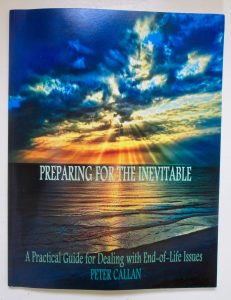Last year, when I was experiencing severe (I referred to them at the time as “killer”) headaches, I quickly got my end-of-life paperwork in order.
My mom, at the age of sixty-nine – three years younger than I am now – died in 1984 of glioblastoma, the same aggressive and still-incurable form of brain cancer that John McCain was recently diagnosed with and Ted Kennedy and Beau Biden died of. I was convinced then, because my headaches, which felt like spikes being pounded into the back of my skull (the same location my mother pointed out on her own head before she received her terminal diagnosis), and because I’ve always suspected that glioblastoma was stalking me, that it was now my turn.
I was wrong about that. My headaches, seemingly stress-related, have since diminished; and as far as I know, glioblastoma’s hairlike tendrils have not found their way into my brain. But it’s a sure thing that I, like all those in my age-cohort, will die of something someday in the not-too-far-off future. I’m just grateful that my brain cancer false alarm forced me to do all my homework in advance of that day.
Speaking of this kind of end-of-life homework, a former writing student of mine at UNM-Taos, Peter Callan, has written an invaluable workbook, titled Preparing for the Inevitable: A Practical Guide for Dealing with End-of-Life Issues. When he was my student and he told me about his book idea, with the early title of Prepare to Die!!!, I thought: Good luck with that!
I feared that most readers (a dying breed, I’ve got to say) tend to avoid such downbeat, Grim-Reaper-ish topics, preferring instead to be buoyantly entertained. But Peter’s book, I’m glad to report, is now in its ninth printing. It clearly fills an important need, which readers seem to appreciate. Just shows you how wrong I can be.

If I hadn’t already made such preparations — writing and revising my advance directives last year — this is the workbook I would want to have and to follow. Peter is a certified paralegal, not an attorney, and he doesn’t pretend to have all the answers; but his guide is a great start. He is thorough, encouraging, and even humorous.
“Being ‘prepared’ might allow you to sleep better,” he states up front. “You’d have a hurricane kit if you lived in Florida, right? Earthquake kit if you lived in California? Tornado kit if you lived in Arkansas? This book costs 20 bucks and bring peace of mind. It’s less than you’d spend in the first 30 minutes of happy hour. Can you afford NOT to know?”
Peter explains it all for you, plus he offers sample forms (such as Last Will, Living Will and Power of Attorney forms), pages of resources and suggested readings, and inspiring quotes throughout. My favorite of those quotes is from Mark Twain: “The fear of death follows from the fear of life. A man [or woman] who lives fully is prepared to die at any time.”
To order a copy of Preparing for the Inevitable, go to Peter’s website: www.LifeIZshort.com or reach him by e-mail at sobeitt@hotmail.com or by phone at 808-854-5635.
Still on the universal subject of death – but coming at it from a different angle – I read recently a new book by the renowned Haitian author Edwidge Danticat, The Art of Death: Writing the Final Story (Graywolf Press, 2017). This slim volume is part of Graywolf’s “The Art of…” series, which aims to provide “sustained examinations of key, but sometimes neglected, aspects of creative writing by some of contemporary literature’s finest practitioners.”
In this book Danticat grapples with the challenge of writing about the death of her beloved mother from ovarian cancer in 2014. And as she grapples, Danticat deftly weaves in dozens of illuminating examples from literature to show how other authors have chosen to handle the subject. Her purpose, as she states in her Introduction, is to “both better understand death and offload my fear of it. I believe reading and writing can help.”
Among the many poignant passages I highlighted in Danticat’s book is this one:
“‘There is no such thing as a natural death,’ Simone de Beauvoir writes in A Very Easy Death, her account of the final weeks of her mother’s life, ‘You do not die from being born, nor from having lived, nor from old age. You die from something. … Cancer, thrombosis, pneumonia: it is as violent and unforeseen as an engine stopping in the middle of the sky….’”
It’s been thirty-three years since my own mother’s death, and I still have not been able to write about it, other than in a passing mention. When my mind returns to those harrowing, heartbreaking memories, my heart tends to fill with bile. She had no advance directives in place — did such things even exist then? – so I was forced to watch helplessly as the American medical professionals took over, keeping her alive long after she would have wanted — long after her quality of life on a scale from one to ten was less than zero – out of, it seemed to me, their own greed of gain and fear of death (masquerading as “heroism”).
I cannot go there, still.
I’m just thankful to be living now in an old, wise country that accepts death as a normal part of life and doesn’t try to capitalize on keeping people alive when Nature would choose otherwise. And I’m especially glad to have all my end-of-life directives in order.
